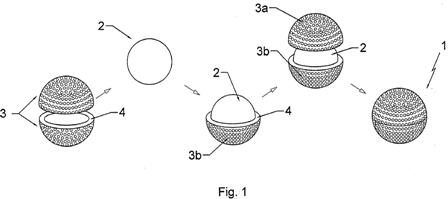How Many Fish Could You Have Fed if Every Golf Ball You Hit into the Water Turned into Fish Food?
Eco-friendly golf ball IP seems to be hot right now. Last week I posted about Nike’s attempt to take on global warming with golf balls, and about a year ago I covered a Bridgestone patent directed to a biodegradable golf ball. What the next logical step? A biodegradable golf ball that turns into fish food, of course.
This week Albus Golf had a patent application publish as US Pub. No. OBJECT OF THE INVENTION
[0001] More specifically the invention refers to golf balls, for use in places where they are sure to get lost by falling into the water (e.g.: sea, ocean, lakes, rivers, ponds, swimming pools and the like), and therefore for single-use, which if abandoned, are biodegradable in water, either fresh or saltwater, and that when they degrade, in about 48 hours, they serve as food for living creatures.
.
.
.
SCOPE OF THE INVENTION
[0006] This invention has been designed to obtain a totally specific product and process to manufacture the same, the main feature of which is the possibility of practicing real golf in places where there is international legislation forbidding it, and always bearing in mind sustainability and respect for the environment, as it is a single-use golf ball, its end, i.e., its useful life is very short, as it is used outside golf courses and always ends up in the water.
[0007] The single-use is a totally new purpose in the current state of the art, and is associated to its immediate biodegradability, with the additional feature of the ball’s core being a specific food product for aquatic creatures, and it therefore disappears in the water, being eaten by water creatures, due to its composition. Therefore, the ball itself helps to improve the sustainability of the aquatic environment.
[0008] In contrast to the current State of the Art, the ball referred to in this invention is designed to be used in places such as beaches, piers, cruise liners, ships, yachts, sea platforms, etc. either in fresh or salt water, where up to now it was not possible to launch balls freely, because if they were to fall outside the playing area they could pollute the bed of the sea, river or lake, and therefore it was necessary to have protective elements (nets) to catch the balls.
[0009] In addition, there is specific international legislation applicable to ships, which forbids launching and disposing of plastic substances into the sea, this is specifically APPENDIX V of the IMO (INTERNATIONAL MARITIME ORGANISATION) MARPOL Convention that refers to the prevention of marine pollution by waste issued from ships.

Nice idea, but the balls seem to be directed to one-shot applications, like off a cruise ship, rather than for use on the course. I wonder how big the market is for single-shot golf balls?
David Dawsey – The Golf Invention Lawyer
PS – click HERE to read more posts about golf ball inventions
